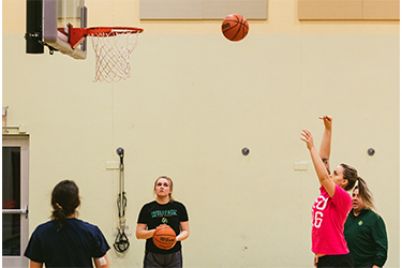
Joe Chapman, president of the WCC Sustainability Club, monitors the discussion after the screening.
By, Esiban Parent
Contributor
There are many global environmental issues today that affect lives and communities. Washtenaw Community College has a student club called Students for Sustainability that do their part locally.
“I’ve heard about [environmental] clubs here before, but they weren’t sustainable; that’s what I’m trying to do,” club President Joe Chapman said at the club meeting held Wednesdays at 4 p.m. Chapman, 21, political science and economics major has an interest in environmental policy.
The club puts up information tables in the Student Center as much as they can, to educate people about things like environmental concerns and upcoming sustainability events. Chapman and fellow members also go to classrooms to advocate for environmental events and issues.

Students of the Sustainability Club organized a screening and discussion of the movie about Bottled water, “Tapped”. The student organization is leading a campaign to ban the sale of bottled water on campus.
A big topic that they talk about during their tabling is what can and can’t be recycled here at WCC. A lot can be learned from the club on this subject, for instance, on-campus, the only recyclable chip bags are Frito-Lay and Sun-Chips.
“In Michigan, the way that we recycle glass is by grinding it down and using it as landfill cover,” Chapman said, “Which sucks.”
Recycled glass is often turned into an aggregate material, used to minimize spreading contaminated water, instead of being remade into other glass bottles.
The club is trying to take steps to expand what can be recycled on campus. Soon candy wrappers will be added to the list of recyclable items. This is due to a very helpful company called TerraCycle.
TerraCycle is a small business based out of Trenton, New Jersey that makes recycling containers and connects specialty recyclers with people recycling things that people wouldn’t always think are recyclable off hand.
Another big recent event for the club was a showing of the movie “Tapped” on Nov. 2. “Tapped” is a 2009 documentary film detailing the harsh effects of bottled water on the economy, society and the environment.
The movie was shown at WCC in the Great Lakes Regional Training Center and is a part of the club’s highest priority: the banning of single-use water bottles at WCC.
They have developed a pledge sheet and have been collecting signatures to convince the Board of Trustees and the Vice President and Chief Financial Officer, William Johnson, that their campaign has sufficient student and faculty support.
On Wednesday, the club discussed plans to get signatures more aggressively. “We’re [each] going to turn in a sheet [of signatures] a week,” said Chapman.
Adrian Ortiz, 18, science and math major and who is the club’s unofficial ‘volunteer god,’ said Chapman. She helps volunteer efforts made by the club especially in volunteering with the Leslie Science and Nature Center where she has volunteered, for two years.
The Leslie Science and Nature Center is a wildlife center in Ann Arbor that aims to educate children and adults about our natural environment.
“The best part about volunteering at the Leslie Science Center is how much I have learned there in the past two years and all of the fantastic people I have been able to volunteer with,” Ortiz said.
The club is also interested in getting involved in the campus Core Garden. This garden is a greenhouse project that creates produce and encourages faculty and students to participate. Food from the garden is free to anyone.
“We have seventy-thousand worms in the greenhouse,” said Chapman. The worms will be used to expedite composting material.
“I think to bring about environmental change, that it’s helpful to have some political clout,” Emily Thompson, faculty advisor for the club said. She sees the students are dedicated to making changes at a progressive rate.
“The students are pretty impressive and they’re involved in two clubs: the Poli-Sci club and The Students for Sustainability club.” said Thompson, Ph. D and professor of life sciences and environmental sciences.
The club is always looking for new members and have more information available about upcoming events on the club’s Facebook page: Students for Sustainability.


